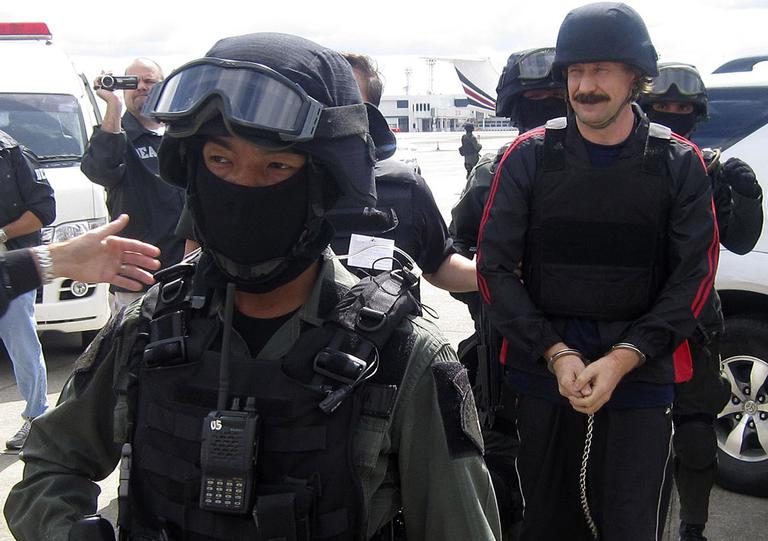Advertisement
Thailand Extradites 'Merchant Of Death' To U.S.

Thailand extradited accused Russian arms trafficker Viktor Bout to the U.S. on Tuesday to face terrorism charges, siding with Washington in a tug of war with Moscow over whether to send him to stand trial or let him go home.
The Cabinet approved Bout's extradition Tuesday after a long legal battle, and police said the 43-year-old was put aboard a plane that departed Bangkok at about 1:30 p.m. (0630 GMT; 1:30 a.m. EST) in the custody of eight U.S. officials.
In New York, a law enforcement said Bout was expected to arrive there around 9 p.m. EST Tuesday. The official, speaking on condition of anonymity because of security concerns, declined to name the airport.
Thai Prime Minister Abhisit Vejjajiva said his Cabinet had approved extradition after acknowledging an earlier appeals court decision that Bout could be legally extradited.
Bout, a former Soviet air force officer who is reputed to have been one of the world's most prolific arms dealers, was arrested at a Bangkok luxury hotel in March 2008 as part of a sting operation led by U.S. Drug Enforcement Administration agents.
Bout has allegedly supplied weapons that fueled civil wars in South America, the Middle East and Africa, with clients including Liberia's Charles Taylor and Libyan leader Moammar Gadhafi and both sides in Angola's civil war. He has been referred to as "The Merchant of Death," and was an inspiration for the arms dealer played by Nicolas Cage in the 2005 film "Lord of War."
The head of a lucrative air transport empire, Bout had long evaded U.N. and U.S. sanctions aimed at blocking his financial activities and restricting his travel. He claims he ran a legitimate business and never sold weapons, and fought hard to avoid extradition.
Thai police commandoes in full combat gear, wearing balaclavas to hide their identities, accompanied Bout from the prison where he was held to the tarmac at Bangkok's Don Muang airport, where at least half-a-dozen Westerners, some wearing jackets identifying them as members of the DEA, helped shepherd Bout onto a chartered jet. Bout wore a bulletproof vest and ballistic helmet over a blue track suit as he boarded the plane.
Bout's wife Alla had rushed to the prison with his lawyer, but did not get to see him before his departure.
Russia on Tuesday described the extradition as "unlawful."
"From a legal point of view what has happened cannot have any rational explanation or justification," said a statement issued in Moscow by the Russian Foreign Ministry.
The statement charged that Bout's extradition was the result of "unprecedented political pressure from the USA on the government and judicial authorities of Thailand."
"There is no way to characterize this other than as interference in administering justice, which puts in doubt the independence of the Thai justice system," the statement said, adding that the Foreign Ministry will "take all necessary measures" to protect Bout's legal rights in accordance with international humanitarian law.
Asked if he was worried that the relations with Russia would be affected, Abhisit said: "We have the duty to perform whatever is deemed necessary... We can't satisfy everyone, we have to admit that."
The U.S. Embassy said it had no immediate comment.
Both Moscow and Washington were reported to have exerted heavy pressure on Abhisit's government. U.S lawmakers also became involved, sending a letter to the Thai government urging extradition.
Russia says Bout is an innocent businessman and wants him in Moscow. Experts say Bout has knowledge of Russia's military and intelligence operations and that Moscow does not want him going on trial in the United States. However, in a statement issued in August through his wife Alla, Bout declared "I don't possess any secrets of the Russian state or its leaders."
Bout was arrested in Bangkok as he met with U.S. agents posing as arms buyers for the Revolutionary Armed Forces of Colombia, or FARC, which Washington classifies as a terrorist organization. He was charged with conspiracy for allegedly trying to smuggle missiles and rocket launchers to the FARC, as well as conspiring to kill U.S. officers or employees. If convicted, he faces a maximum penalty of life in prison.
Peter Danssaert, a weapons trafficking expert at the International Peace Information Service - an independent, Belgium-based institute that focuses on Sub-Saharan Africa - said the U.S approach might not shed much light on the illicit trade.
"When the U.S. government goes for the FARC charges, we will never truly discover what he did in Africa, because this will not be part of this trial," Danssaert said in an e-mail to The Associated Press. "Most likely 'some' will be very happy that the Africa allegations never make it into a court of law." Danssaert and other researchers have suggested that allies of the United States were also involved in illicit arms trafficking, but won't be exposed for political reasons.
The extradition came just a few days before a deadline that might have let Bout walk free. The same Thai court that last month gave the final go-ahead for his extradition also had declared that Bout had to be extradited before Nov. 20, or else be released.
A Thai court in August of 2009 originally rejected Washington's request for Bout's extradition on terrorism-related charges. After that ruling was reversed by an appeals court in August this year, the U.S. moved to get him out quickly, sending a special plane to stand by.
However, just ahead of the appeals court ruling, the United States had forwarded new money-laundering and wire fraud charges to Thailand in an attempt to keep Bout detained if the court ordered his release. But the move backfired and caused a new delay, and only an early October court ruling cleared the final path to extradition.
U.S. federal prosecutors planned a news conference for late Wednesday morning in New York City.
This program aired on November 16, 2010. The audio for this program is not available.